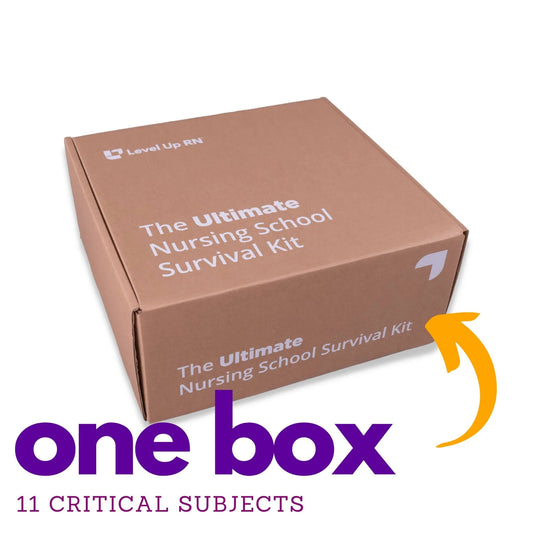Nursing Tips (659)
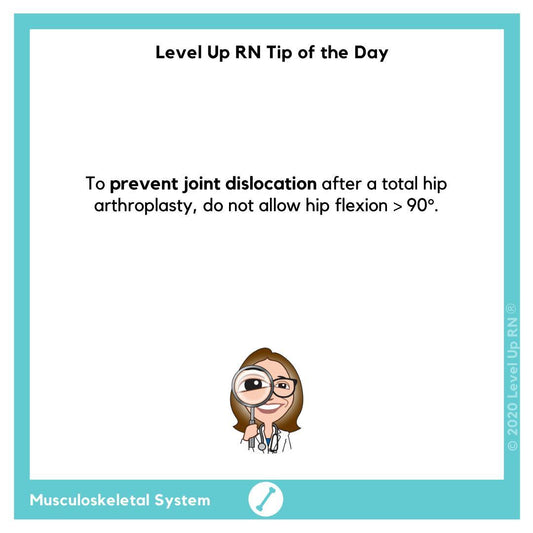
Joint Dislocation Prevention
To prevent joint dislocation after a total hip arthroplasty, do not allow hip flexion > 90°.
Joint Dislocation Prevention
To prevent joint dislocation after a total hip arthroplasty, do not allow hip flexion > 90°.
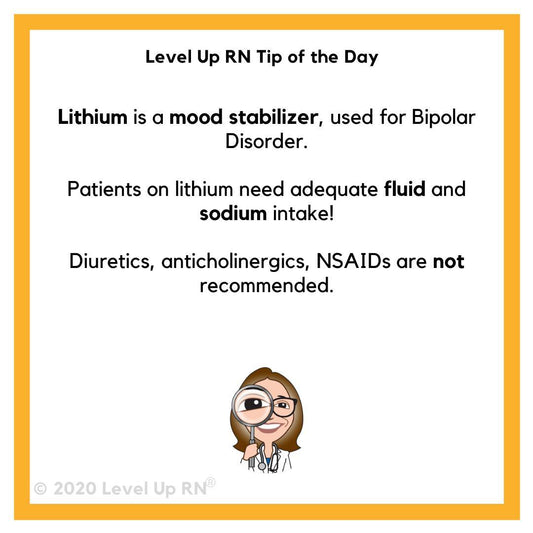
Lithium
Lithium is a mood stabilizer, used for Bipolar Disorder. Patients on lithium need adequate fluid and sodium intake! Diuretics, anticholinergics, NSAIDs are not recommended.
Lithium
Lithium is a mood stabilizer, used for Bipolar Disorder. Patients on lithium need adequate fluid and sodium intake! Diuretics, anticholinergics, NSAIDs are not recommended.
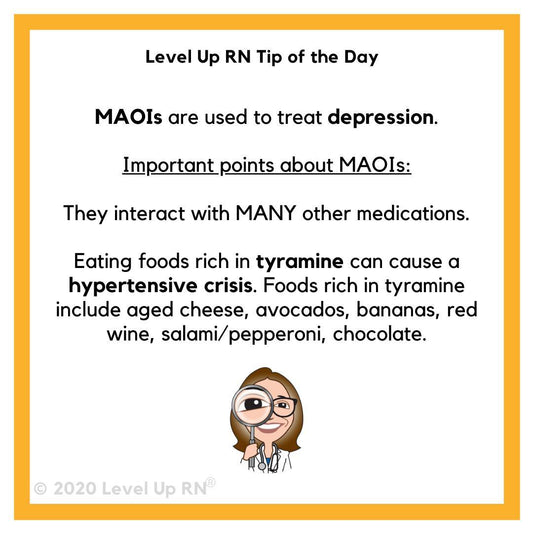
MAOIS for Depression
MAOIs are used to treat depression. Important points about MAOIs: They interact with MANY other medications. Eating foods rich in tyramine can cause a hypertensive crisis. Foods rich in tyramine include...
MAOIS for Depression
MAOIs are used to treat depression. Important points about MAOIs: They interact with MANY other medications. Eating foods rich in tyramine can cause a hypertensive crisis. Foods rich in tyramine include...
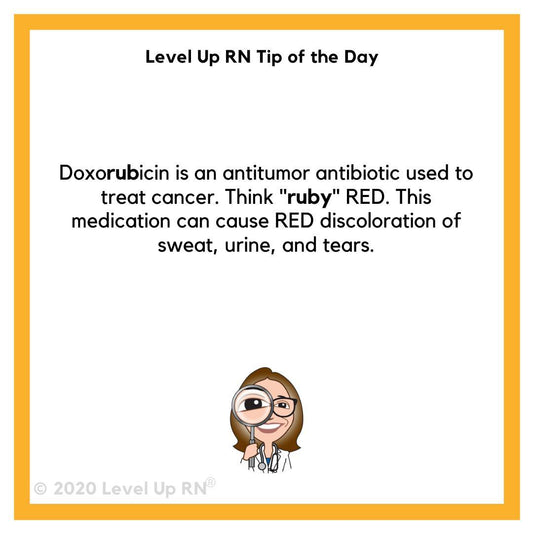
Doxorubicin
Doxorubicin is an antitumor antibiotic used to treat cancer. Think "ruby" RED. This medication can cause RED discoloration of sweat, urine, and tears.
Doxorubicin
Doxorubicin is an antitumor antibiotic used to treat cancer. Think "ruby" RED. This medication can cause RED discoloration of sweat, urine, and tears.
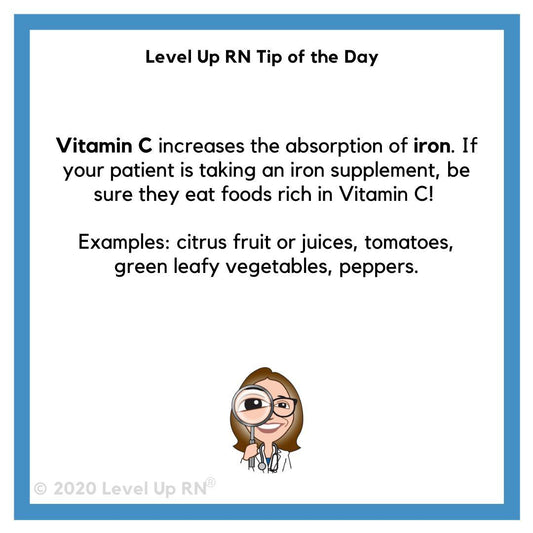
Vitamin C and Iron
Vitamin C increases the absorption of iron. If your patient is taking an iron supplement, be sure they eat foods rich in Vitamin C! Examples: citrus fruit or juices, tomatoes,...
Vitamin C and Iron
Vitamin C increases the absorption of iron. If your patient is taking an iron supplement, be sure they eat foods rich in Vitamin C! Examples: citrus fruit or juices, tomatoes,...
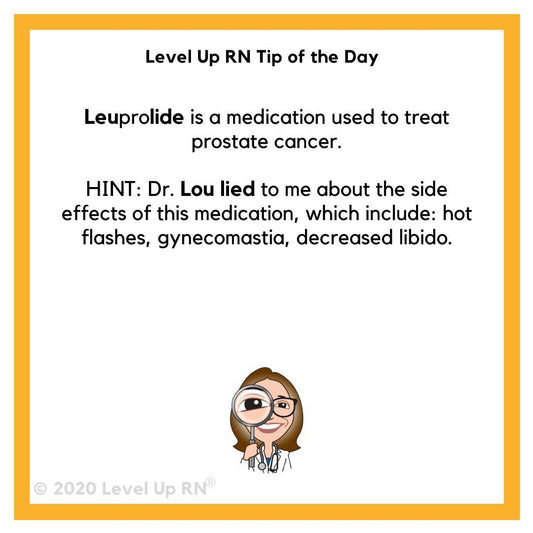
Leuprolide
Leuprolide is a medication used to treat prostate cancer. HINT: Dr. Lou lied to me about the side effects of this medication, which include: hot flashes, gynecomastia, decreased libido.
Leuprolide
Leuprolide is a medication used to treat prostate cancer. HINT: Dr. Lou lied to me about the side effects of this medication, which include: hot flashes, gynecomastia, decreased libido.
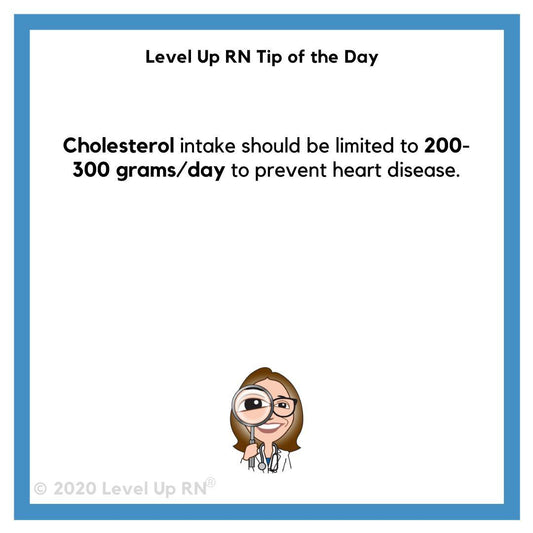
Cholesterol Intake
Cholesterol intake should be limited to 200-300 grams/day to prevent heart disease.
Cholesterol Intake
Cholesterol intake should be limited to 200-300 grams/day to prevent heart disease.
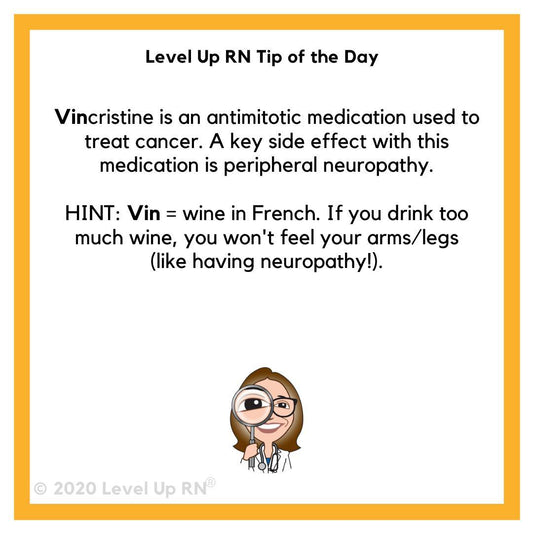
Vincristine
Vincristine is an antimitotic medication used to treat cancer. A key side effect with this medication is peripheral neuropathy. HINT: Vin = wine in French. If you drink too much...
Vincristine
Vincristine is an antimitotic medication used to treat cancer. A key side effect with this medication is peripheral neuropathy. HINT: Vin = wine in French. If you drink too much...
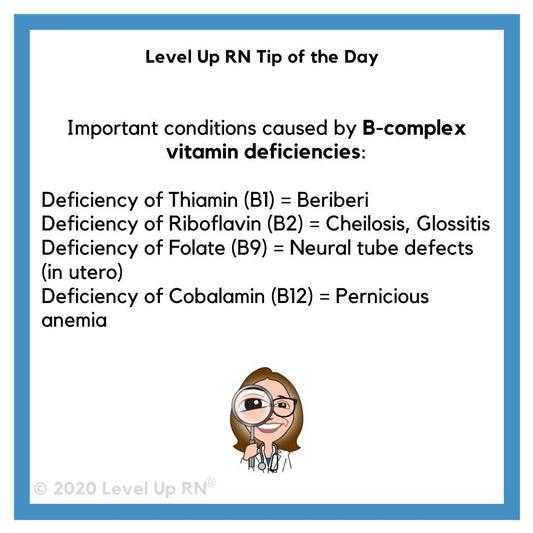
B-Complex Vitamin Deficiencies
Important conditions caused by B-complex vitamin deficiencies: Deficiency of Thiamin (B1) = Beriberi Deficiency of Riboflavin (B2) = Cheilosis, Glossitis Deficiency of Folate (B9) = Neural tube defects (in utero)...
B-Complex Vitamin Deficiencies
Important conditions caused by B-complex vitamin deficiencies: Deficiency of Thiamin (B1) = Beriberi Deficiency of Riboflavin (B2) = Cheilosis, Glossitis Deficiency of Folate (B9) = Neural tube defects (in utero)...
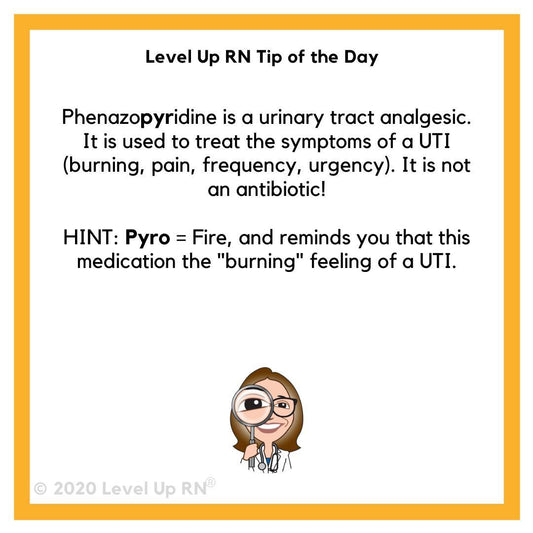
Phenazopyridine
Phenazopyridine is a urinary tract analgesic. It is used to treat the symptoms of a UTI (burning, pain, frequency, urgency). It is not an antibiotic! HINT: Pyro = Fire, and...
Phenazopyridine
Phenazopyridine is a urinary tract analgesic. It is used to treat the symptoms of a UTI (burning, pain, frequency, urgency). It is not an antibiotic! HINT: Pyro = Fire, and...
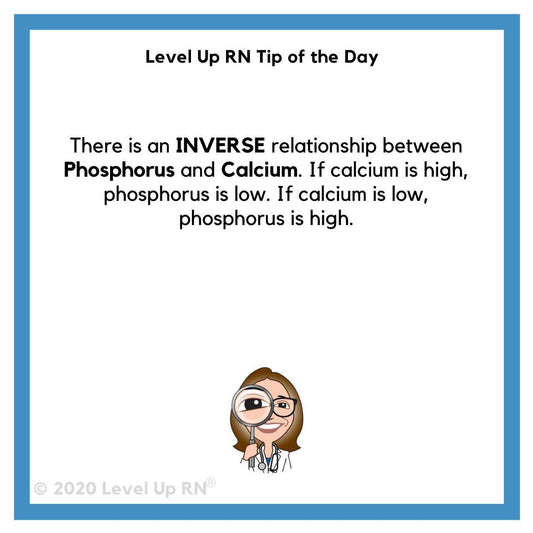
Phosphorus and Calcium Nutrition
There is an INVERSE relationship between Phosphorus and Calcium. If calcium is high, phosphorus is low. If calcium is low, phosphorus is high.
Phosphorus and Calcium Nutrition
There is an INVERSE relationship between Phosphorus and Calcium. If calcium is high, phosphorus is low. If calcium is low, phosphorus is high.
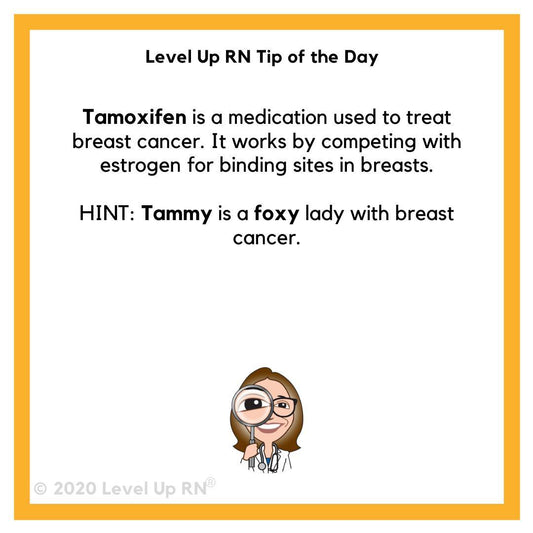
Tamoxifen
Tamoxifen is a medication used to treat breast cancer. It works by competing with estrogen for binding sites in breasts. HINT: Tammy is a foxy lady with breast cancer.
Tamoxifen
Tamoxifen is a medication used to treat breast cancer. It works by competing with estrogen for binding sites in breasts. HINT: Tammy is a foxy lady with breast cancer.
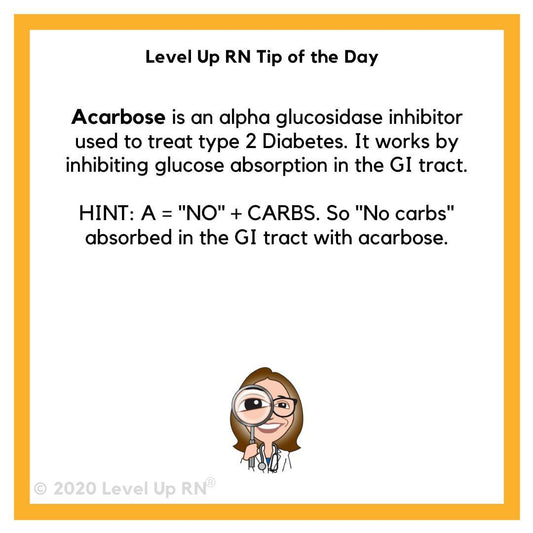
Acarbose
Acarbose is an alpha glucosidase inhibitor used to treat type 2 Diabetes. It works by inhibiting glucose absorption in the GI tract. HINT: A = "NO" + CARBS. So "No...
Acarbose
Acarbose is an alpha glucosidase inhibitor used to treat type 2 Diabetes. It works by inhibiting glucose absorption in the GI tract. HINT: A = "NO" + CARBS. So "No...
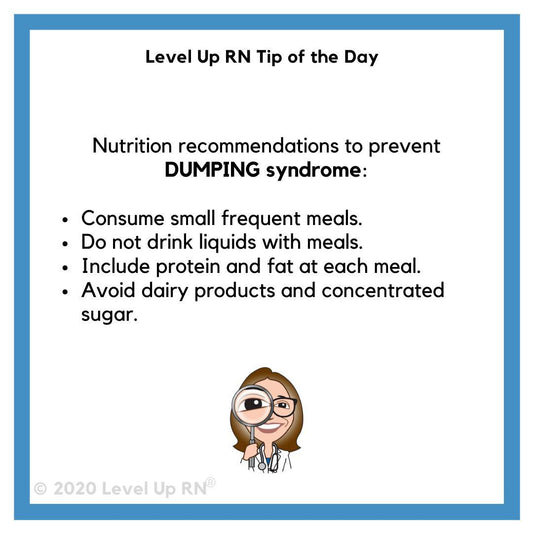
Dumping Syndrome Nutrition
Nutrition recommendations to prevent DUMPING syndrome: Consume small frequent meals. Do not drink liquids with meals. Include protein and fat at each meal. Avoid dairy products and concentrated sugar.
Dumping Syndrome Nutrition
Nutrition recommendations to prevent DUMPING syndrome: Consume small frequent meals. Do not drink liquids with meals. Include protein and fat at each meal. Avoid dairy products and concentrated sugar.
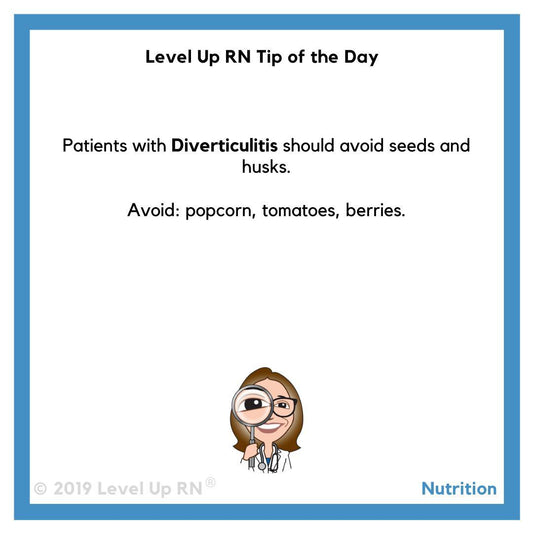
Diverticulitis Nutrition
Patients with Diverticulitis should avoid seeds and husks. Avoid: popcorn, tomatoes, berries.
Diverticulitis Nutrition
Patients with Diverticulitis should avoid seeds and husks. Avoid: popcorn, tomatoes, berries.
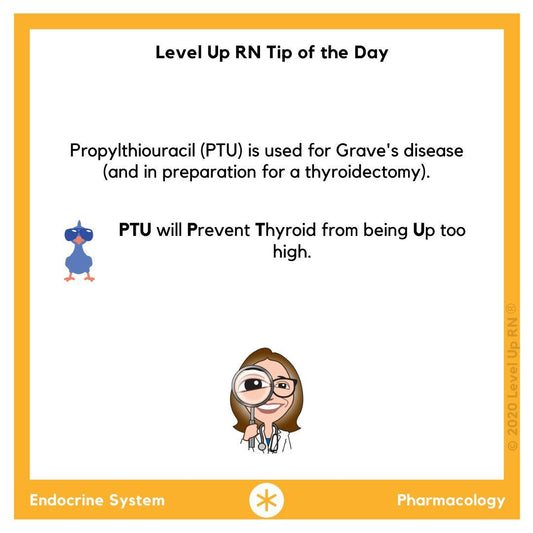
Propylthiouracil (PTU)
Propylthiouracil (PTU) is used for Grave's disease (and in preparation for a thyroidectomy). HINT: PTU will Prevent Thyroid from being Up too high.
Propylthiouracil (PTU)
Propylthiouracil (PTU) is used for Grave's disease (and in preparation for a thyroidectomy). HINT: PTU will Prevent Thyroid from being Up too high.
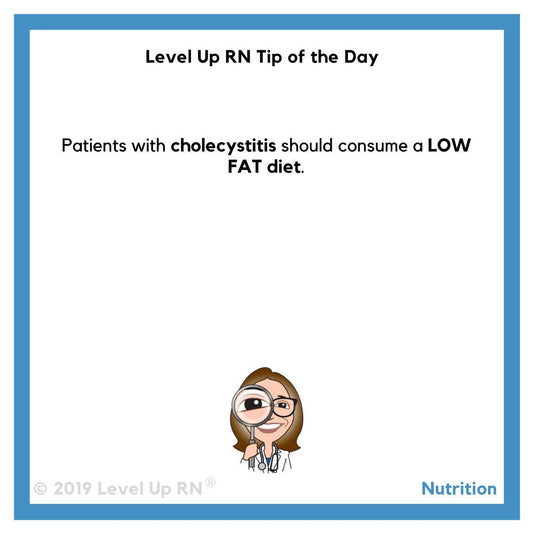
Cholecystitis Nutrition
Patients with cholecystitis should consume a LOW FAT diet.
Cholecystitis Nutrition
Patients with cholecystitis should consume a LOW FAT diet.
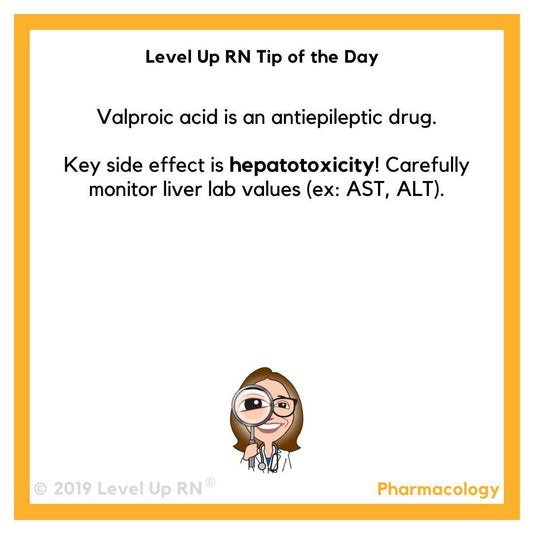
Valproic Acid
Valproic acid is an antiepileptic drug. Key side effect is hepatotoxicity! Carefully monitor liver lab values (ex: AST, ALT).
Valproic Acid
Valproic acid is an antiepileptic drug. Key side effect is hepatotoxicity! Carefully monitor liver lab values (ex: AST, ALT).
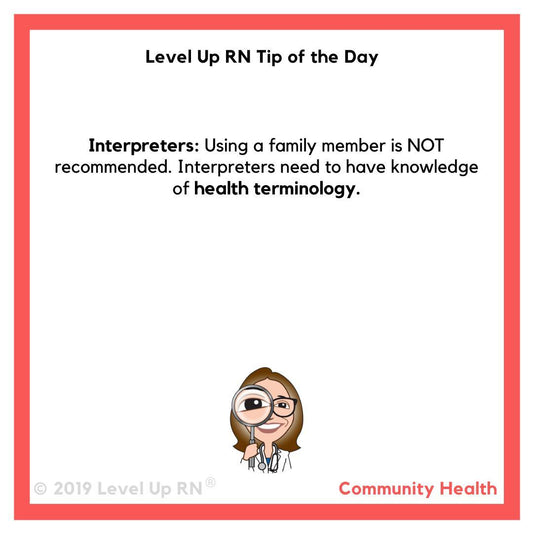
Interpreters
Interpreters: Using a family member is NOT recommended. Interpreters need to have knowledge of health terminology.
Interpreters
Interpreters: Using a family member is NOT recommended. Interpreters need to have knowledge of health terminology.
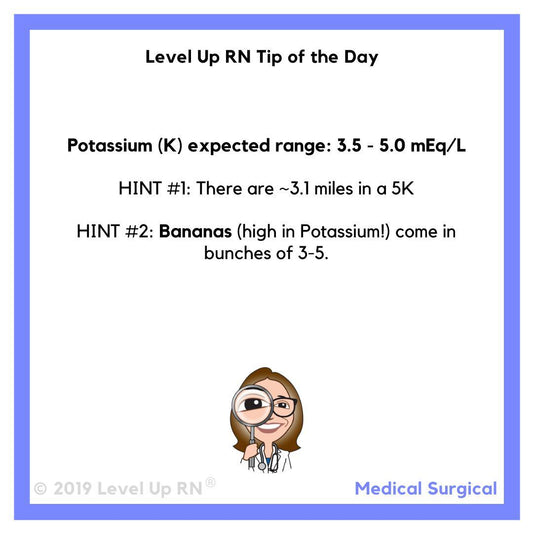
Potassium Ranges
Potassium (K) expected range: 3.5 - 5.0 mEq/L HINT #1: There are ~3.1 miles in a 5K HINT #2: Bananas (high in Potassium!) come in bunches of 3-5.
Potassium Ranges
Potassium (K) expected range: 3.5 - 5.0 mEq/L HINT #1: There are ~3.1 miles in a 5K HINT #2: Bananas (high in Potassium!) come in bunches of 3-5.
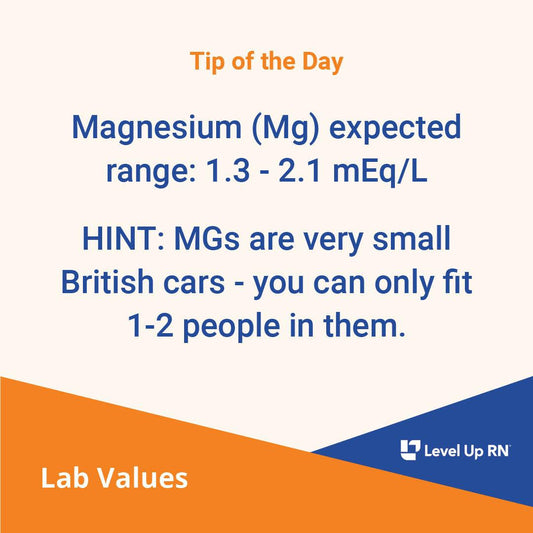
Magnesium Ranges
Magnesium (Mg) expected range: 1.3 - 2.1 mEq/L HINT: MGs are very small British cars - you can only fit 1-2 people in them.
Magnesium Ranges
Magnesium (Mg) expected range: 1.3 - 2.1 mEq/L HINT: MGs are very small British cars - you can only fit 1-2 people in them.
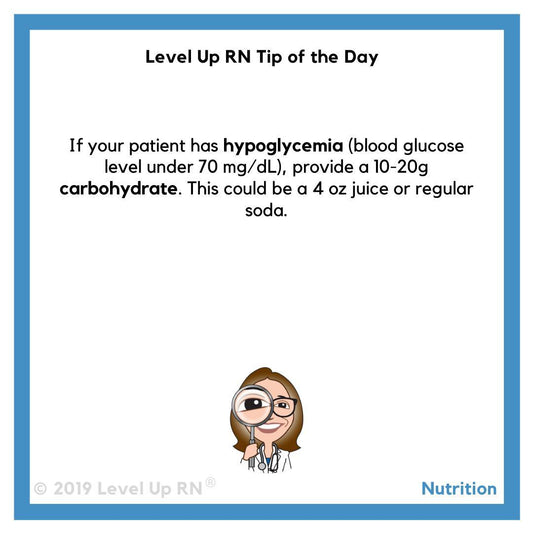
Hypoglycemia
If your patient has hypoglycemia (blood glucose level under 70 mg/dL), provide a 10-20g carbohydrate. This could be a 4 oz juice or regular soda.
Hypoglycemia
If your patient has hypoglycemia (blood glucose level under 70 mg/dL), provide a 10-20g carbohydrate. This could be a 4 oz juice or regular soda.
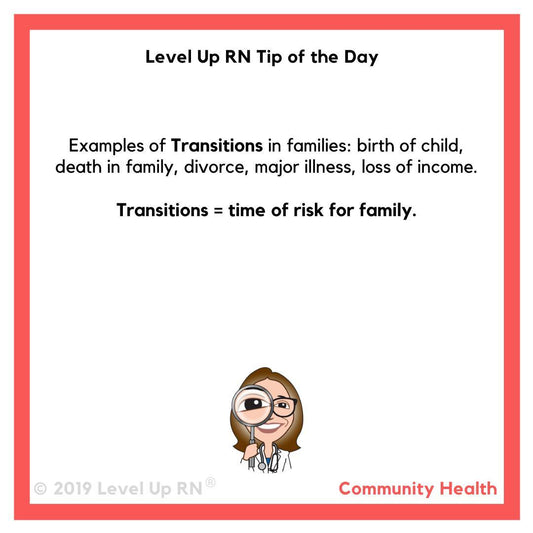
Family Transitions
Examples of Transitions in families: birth of child, death in family, divorce, major illness, loss of income. Transitions = time of risk for family.
Family Transitions
Examples of Transitions in families: birth of child, death in family, divorce, major illness, loss of income. Transitions = time of risk for family.
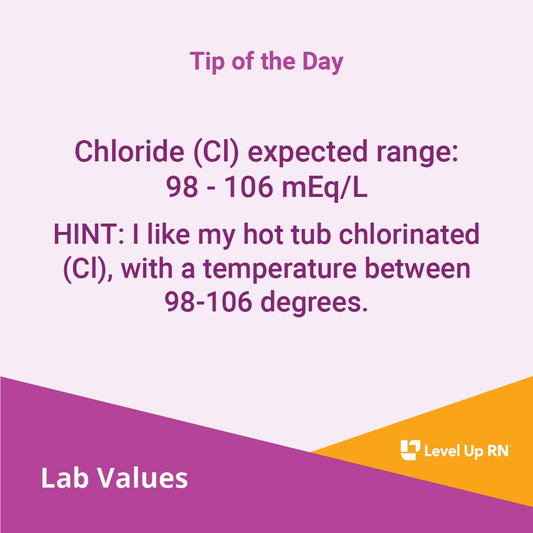
Chloride: Expected Range
Chloride (Cl) expected range: 98 - 106 mEq/L HINT: I like my hot tub chlorinated, with a temperature between 98-106 degrees.
Chloride: Expected Range
Chloride (Cl) expected range: 98 - 106 mEq/L HINT: I like my hot tub chlorinated, with a temperature between 98-106 degrees.
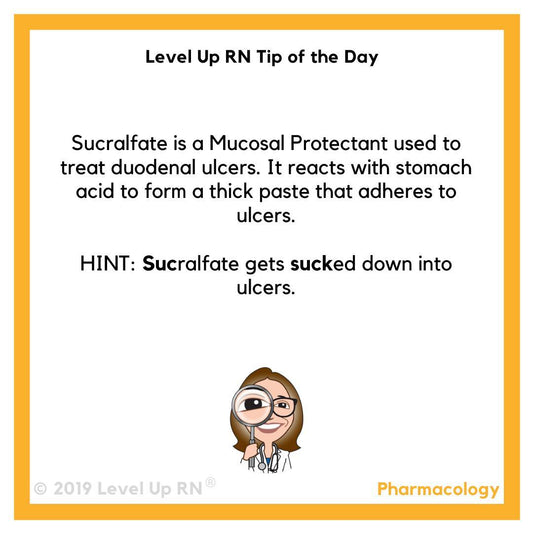
Sucralfate
Sucralfate is a Mucosal Protectant used to treat duodenal ulcers. It reacts with stomach acid to form a thick paste that adheres to ulcers. HINT: Sucralfate gets sucked down into ulcers.
Sucralfate
Sucralfate is a Mucosal Protectant used to treat duodenal ulcers. It reacts with stomach acid to form a thick paste that adheres to ulcers. HINT: Sucralfate gets sucked down into ulcers.
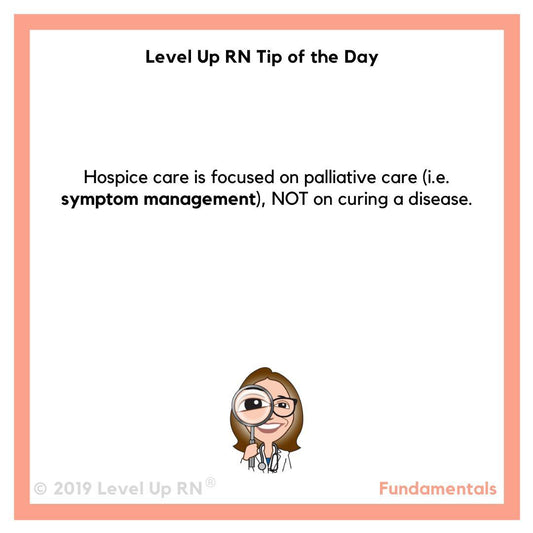
Hospice Care
Hospice care is focused on palliative care (i.e. symptom management), NOT on curing a disease.
Hospice Care
Hospice care is focused on palliative care (i.e. symptom management), NOT on curing a disease.
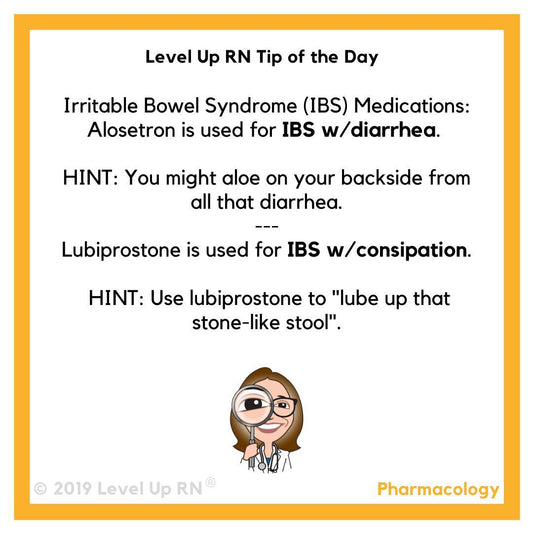
IBS Medications
Irritable Bowel Syndrome (IBS) Medications: alosetron is used for IBS w/diarrhea.HINT: You might aloe on your backside from all that diarrhea. Lubiprostone is used for IBS w/consipation. HINT: Use lubiprostone to "lube up...
IBS Medications
Irritable Bowel Syndrome (IBS) Medications: alosetron is used for IBS w/diarrhea.HINT: You might aloe on your backside from all that diarrhea. Lubiprostone is used for IBS w/consipation. HINT: Use lubiprostone to "lube up...
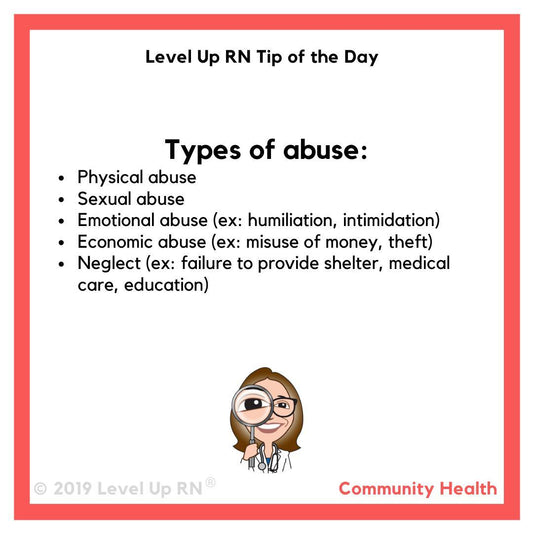
Types of Abuse
Types of abuse: Physical abuse Sexual abuse Emotional abuse (ex: humiliation, intimidation) Neglect (ex: failure to provide shelter, medical care, education) Economic abuse (ex: misuse of money, theft)
Types of Abuse
Types of abuse: Physical abuse Sexual abuse Emotional abuse (ex: humiliation, intimidation) Neglect (ex: failure to provide shelter, medical care, education) Economic abuse (ex: misuse of money, theft)
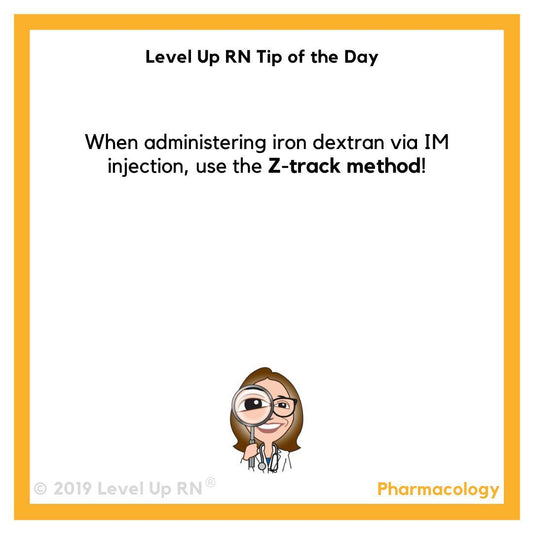
Z-Track Method
When administering iron dextran via IM injection, use the Z-track method!
Z-Track Method
When administering iron dextran via IM injection, use the Z-track method!
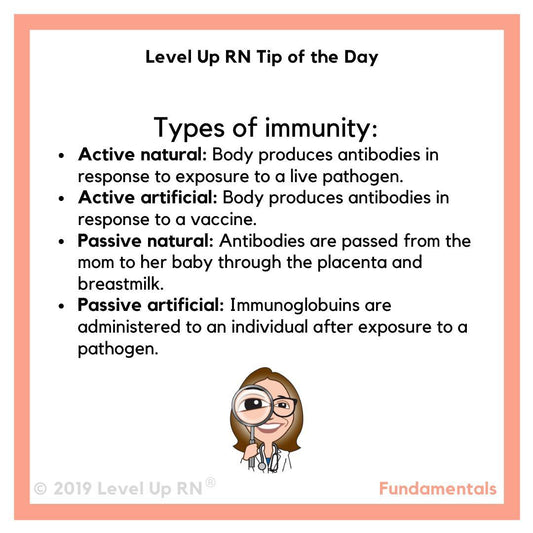
Types of Immunity
Types of immunity: Active natural: Body produces antibodies in response to exposure to a live pathogen. Active artificial: Body produces antibodies in response to a vaccine. Passive natural: Antibodies are passed from the...
Types of Immunity
Types of immunity: Active natural: Body produces antibodies in response to exposure to a live pathogen. Active artificial: Body produces antibodies in response to a vaccine. Passive natural: Antibodies are passed from the...
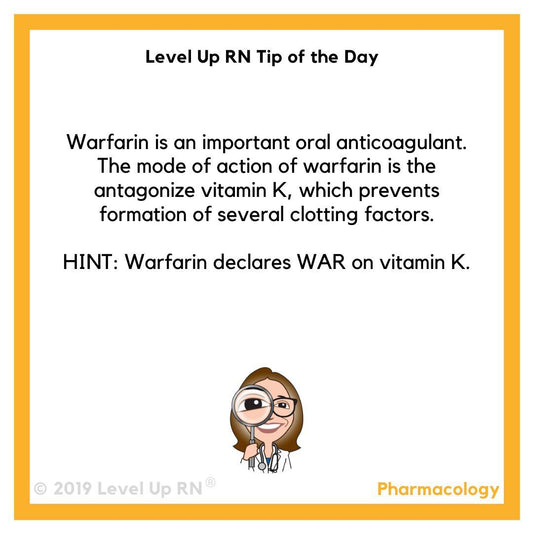
Warfarin
Warfarin is an important oral anticoagulant. The mode of action of warfarin is the antagonize vitamin K, which prevents formation of several clotting factors. HINT: Warfarin declares WAR on vitamin...
Warfarin
Warfarin is an important oral anticoagulant. The mode of action of warfarin is the antagonize vitamin K, which prevents formation of several clotting factors. HINT: Warfarin declares WAR on vitamin...
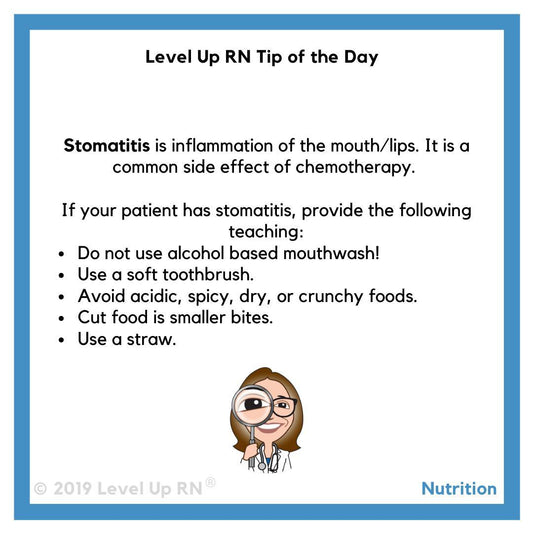
Stomatitis
Stomatitis is inflammation of the mouth/lips. It is a common side effect of chemotherapy. If your patient has stomatitis, provide the following teaching: Do not use alcohol based mouthwash! Use...
Stomatitis
Stomatitis is inflammation of the mouth/lips. It is a common side effect of chemotherapy. If your patient has stomatitis, provide the following teaching: Do not use alcohol based mouthwash! Use...
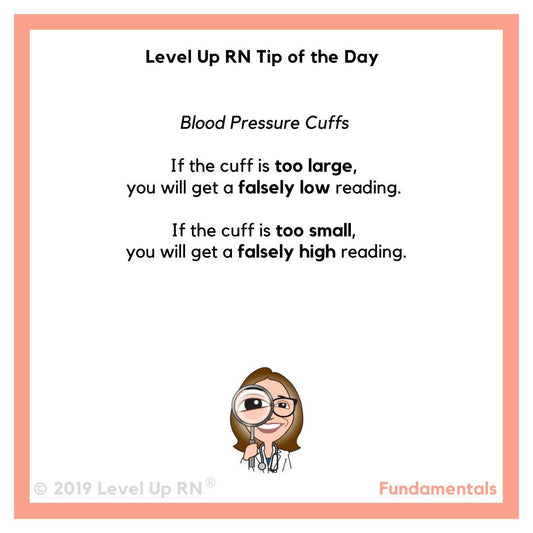
BP Cuffs
Blood pressure cuffs: If the cuff is too large, you will get a falsely low reading. If the cuff is too small, you will get a falsely high reading.
BP Cuffs
Blood pressure cuffs: If the cuff is too large, you will get a falsely low reading. If the cuff is too small, you will get a falsely high reading.
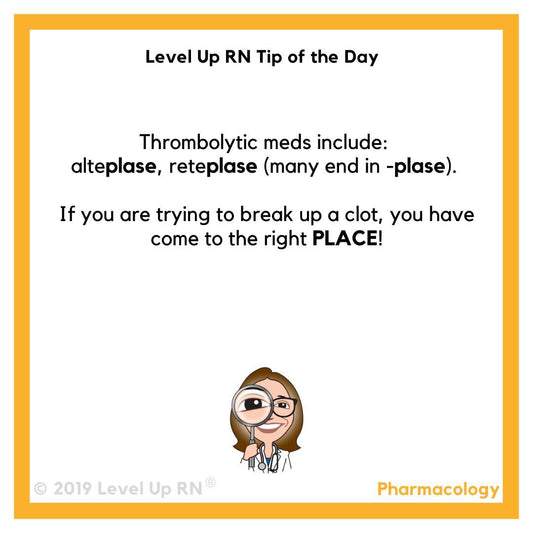
Thrombolytic Meds
Thrombolytic meds include: alteplase, reteplase (many end in -plase). If you are trying to break up a clot, you have come to the right PLACE!
Thrombolytic Meds
Thrombolytic meds include: alteplase, reteplase (many end in -plase). If you are trying to break up a clot, you have come to the right PLACE!
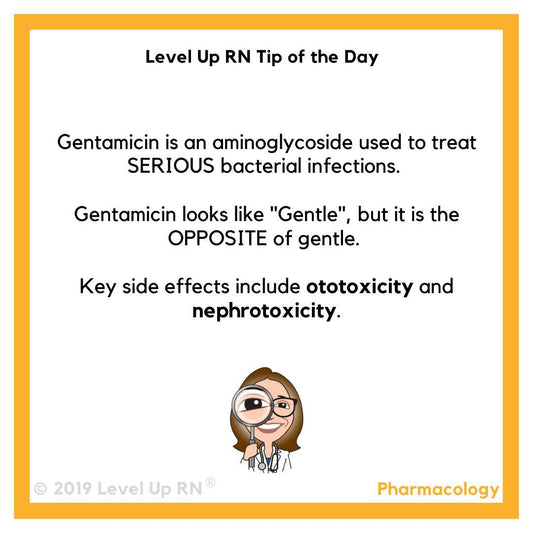
Gentamicin
Gentamicin is an aminoglycoside used to treat SERIOUS bacterial infections. Gentamicin looks like "Gentle", but it is the OPPOSITE of gentle. Key side effects include ototoxicity and nephrotoxicity.
Gentamicin
Gentamicin is an aminoglycoside used to treat SERIOUS bacterial infections. Gentamicin looks like "Gentle", but it is the OPPOSITE of gentle. Key side effects include ototoxicity and nephrotoxicity.
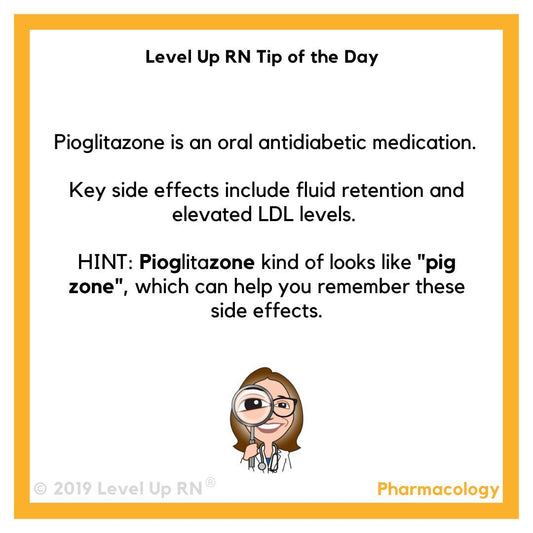
Pioglitazone
Pioglitazone is an oral antidiabetic medication. Key side effects include fluid retention and elevated LDL levels. HINT: Pioglitazone kind of looks like "pig zone", which can help you remember these...
Pioglitazone
Pioglitazone is an oral antidiabetic medication. Key side effects include fluid retention and elevated LDL levels. HINT: Pioglitazone kind of looks like "pig zone", which can help you remember these...
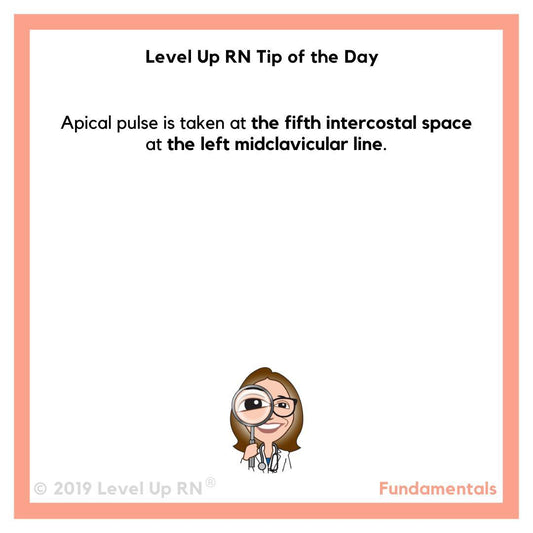
Apical Pulse
Apical pulse is taken at the fifth intercostal space at the left midclavicular line.
Apical Pulse
Apical pulse is taken at the fifth intercostal space at the left midclavicular line.
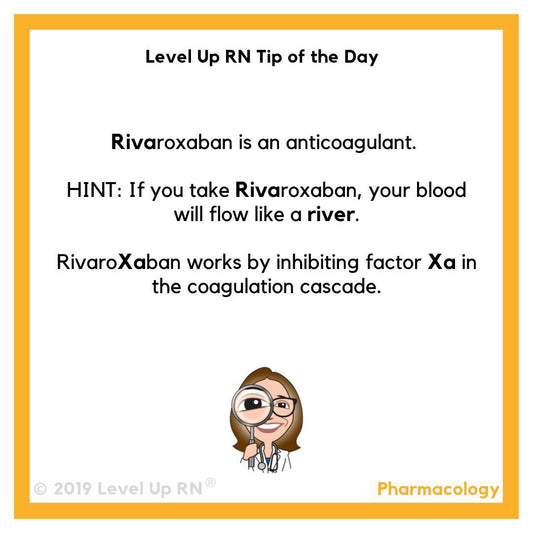
Rivaroxaban
Rivaroxaban is an anticoagulant. HINT: If you take Rivaroxaban, your blood will flow like a river. RivaroXaban works by inhibiting factor Xa in the coagulation cascade.
Rivaroxaban
Rivaroxaban is an anticoagulant. HINT: If you take Rivaroxaban, your blood will flow like a river. RivaroXaban works by inhibiting factor Xa in the coagulation cascade.
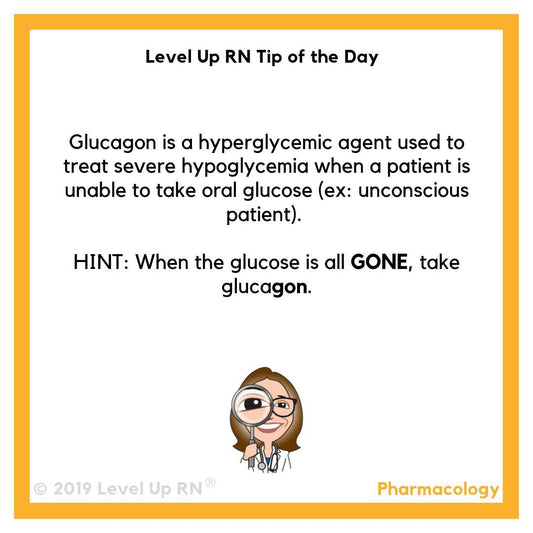
Glucagon
Glucagon is a hyperglycemic agent used to treat severe hypoglycemia wihen a patient is unable to take oral glucose (ex: unconscious patient). HINT: When the glucose is all GONE, take...
Glucagon
Glucagon is a hyperglycemic agent used to treat severe hypoglycemia wihen a patient is unable to take oral glucose (ex: unconscious patient). HINT: When the glucose is all GONE, take...
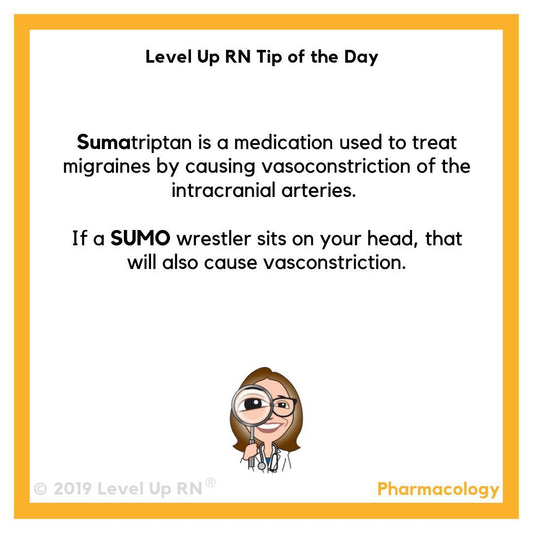
Sumatriptan
Sumatriptan is a medication used to treat migraines by causing vasoconstriction of the intracranial arteries. If a SUMO wrestler sits on your head, that will also cause vasoconstriction.
Sumatriptan
Sumatriptan is a medication used to treat migraines by causing vasoconstriction of the intracranial arteries. If a SUMO wrestler sits on your head, that will also cause vasoconstriction.
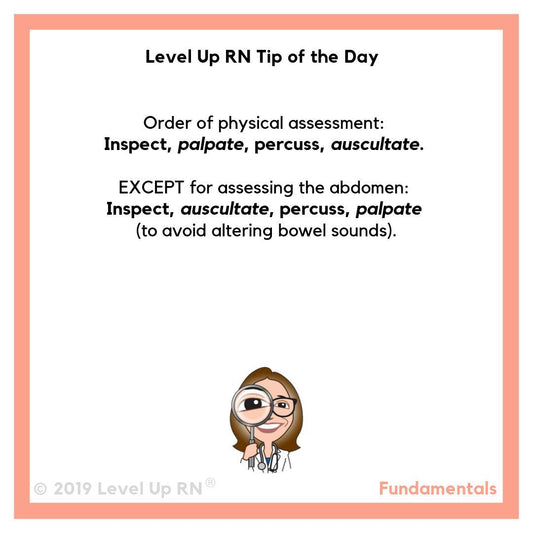
Physical Assessment Order
Order of physical assessment: Inspect, palpate, percuss, auscultate. EXCEPT for assessing the abdomen: Inspect, auscultate, percuss, palpate (to avoid altering bowel sounds).
Physical Assessment Order
Order of physical assessment: Inspect, palpate, percuss, auscultate. EXCEPT for assessing the abdomen: Inspect, auscultate, percuss, palpate (to avoid altering bowel sounds).
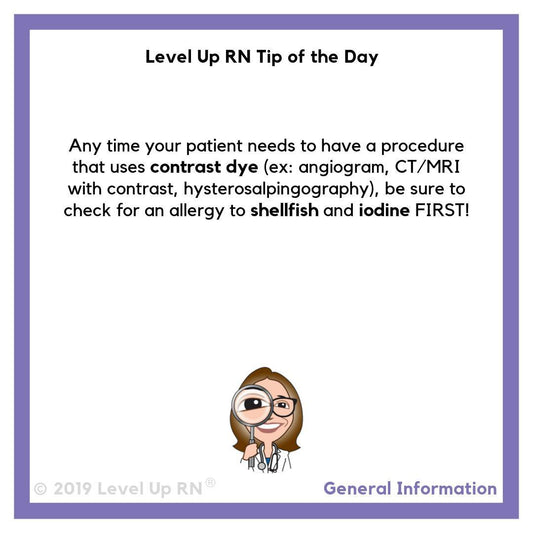
Contrast Dye
Any time your patient needs to have a procedure that uses contrast dye (ex: angiogram, CT/MRI with contrast, hysterosalpingography), be sure to check for an allergy to shellfish and iodine...
Contrast Dye
Any time your patient needs to have a procedure that uses contrast dye (ex: angiogram, CT/MRI with contrast, hysterosalpingography), be sure to check for an allergy to shellfish and iodine...
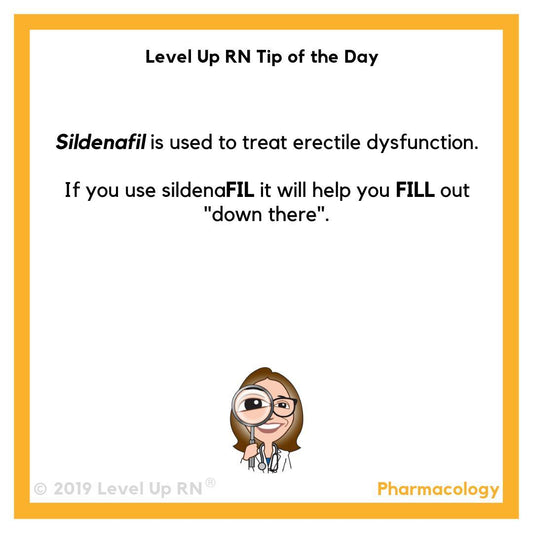
Sildenafil
Sildenafil is used to treat erectile dysfunction. If you use sildenafil it will help you fill out "down there".
Sildenafil
Sildenafil is used to treat erectile dysfunction. If you use sildenafil it will help you fill out "down there".
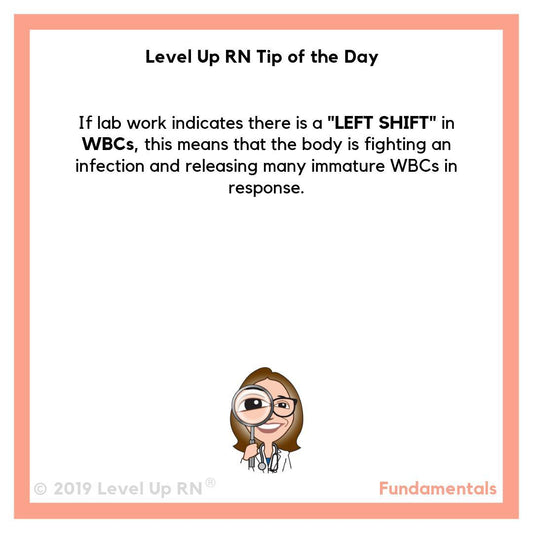
Left Shift in WBCs
If labwork indicates there is a "Left Shift" in WBCs, this means that the body is fighting an infection and releasing many immature WBCs in response.
Left Shift in WBCs
If labwork indicates there is a "Left Shift" in WBCs, this means that the body is fighting an infection and releasing many immature WBCs in response.
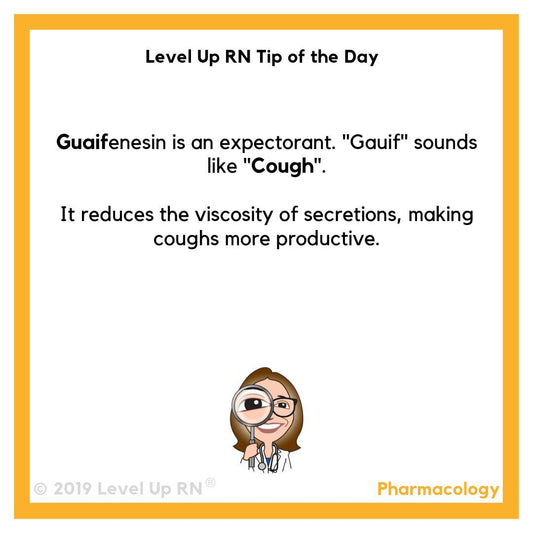
Guaifenesin
Guaifenesin is an expectorant. "Gauif" sounds like "Cough". It reduces the viscosity of secretions, making coughs more productive.
Guaifenesin
Guaifenesin is an expectorant. "Gauif" sounds like "Cough". It reduces the viscosity of secretions, making coughs more productive.
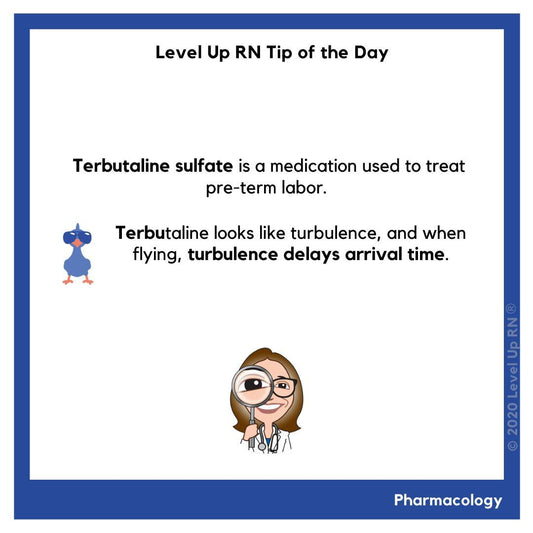
Terbutaline Sulfate
Terbutaline sulfate is a medication used to treat pre-term labor. HINT: Terbutaline looks like turbulence, and when flying, turbulence delays arrival time.
Terbutaline Sulfate
Terbutaline sulfate is a medication used to treat pre-term labor. HINT: Terbutaline looks like turbulence, and when flying, turbulence delays arrival time.
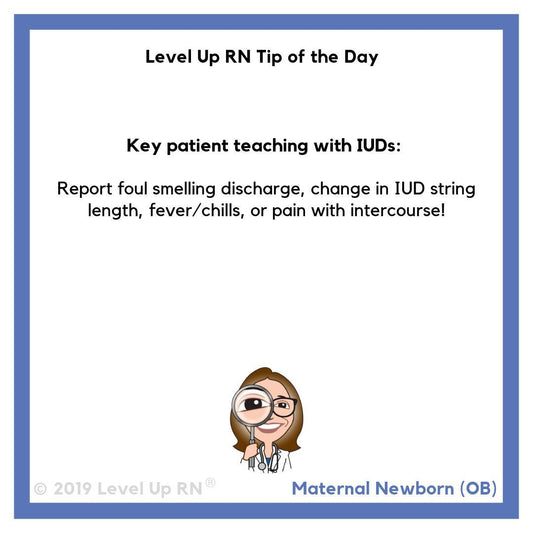
Key Patient Teaching: IUDs
Key patient teaching with IUDs: Report foul smelling discharge, change in IUD string length, fever/chills, or pain with intercourse!
Key Patient Teaching: IUDs
Key patient teaching with IUDs: Report foul smelling discharge, change in IUD string length, fever/chills, or pain with intercourse!
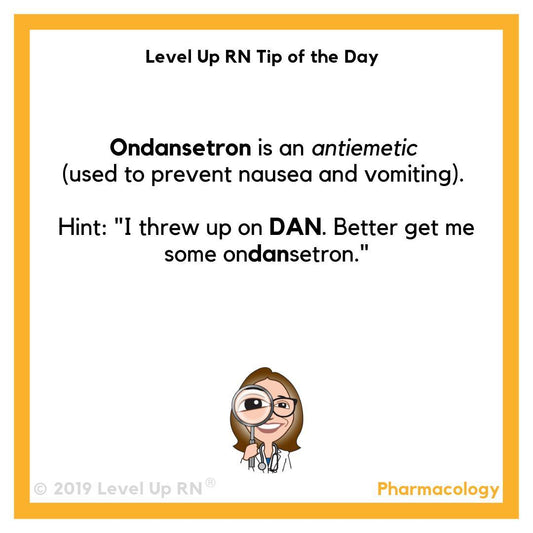
Ondansetron
Ondansetron is an antiemetic (used to prevent nausea and vomiting). Hint: "I threw up on DAN. Better get me some ondansetron."
Ondansetron
Ondansetron is an antiemetic (used to prevent nausea and vomiting). Hint: "I threw up on DAN. Better get me some ondansetron."
Filter Articles
Shop
The Ultimate Nursing School Survival Kit - with Flashables and Membership
4.875 / 5.0
(240) 240 total reviews
Regular price $349.95Regular priceUnit price / per$817.95Sale price $349.95SaleVideos by Subject
Tips & More
Exam Information
Subscribe


